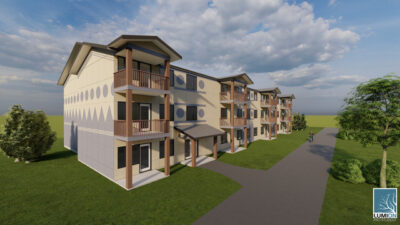Aboriginal Housing Society prepared to get affordable housing project underway
By Troy Bannerman - Lethbridge Herald Local Journalism Initiative Reporter on December 16, 2022.
 A rendering courtesy Douglas J. Bergen & Associates Ltd. of the Aboriginal Housing Society project.
A rendering courtesy Douglas J. Bergen & Associates Ltd. of the Aboriginal Housing Society project.For the last three years the Aboriginal Housing Society has been working on a project to build 132 new affordable housing units in Lethbridge.
“If you look at the Municipal Housing Strategy there’s a core need for 3900 homes, or doors within this community that deal with affordable and appropriate housing for middle to lower income,” said chairperson Tom Mackenzie this week in an interview with the Herald. “That’s a need identified in the strategy. The community wellness speaks well about the need for safe homes. None of us can prosper or do well if we don’t have a safe home to go to and a healthy place to rear our families and to grow. And the Municipal Development Plan for the city talks about diverse housing. And there is a huge need for this sort of housing. And, as I’ve said we help build the communities. We built art centres, we built recreation centres, we worked with exhibition. All those things are important to develop a healthy and diverse community, one of the action plans of the city. But we also need to take care of the less fortunate, and build that social capital and that social concept within the city that so many people recognize.”
On Tuesday, Lethbridge city council voted unanimously to allocate $1.5 million from the Affordable and Social Housing Grant to the Aboriginal Housing Society for construction of the Legacy Ridge Housing Project.
The funding is subject to the execution of a third party contribution agreement in a form satisfactory to the city manager.
Addressing the immediate need that our community has for affordable and safe housing is vital in the future.
“We have 156 applicants on file right now [waiting for homes]. We know that Lethbridge Housing Authority has 800 applicants on file right now [waiting] for affordable and appropriate housing within the city of Lethbridge.”
The Aboriginal Housing Society was formed as a not-for-profit in 2005.
“It was by then-president of the Sik-Ooh-Kotoki Friendship Centre, Roland Cotton, (and) Harold Beaulieu, Jim Short, and Rod McLeod, a Metis Elder, who all through their work with the Friendship Society and different organizations they’re with, saw the struggles of Indigenous people finding housing in Lethbridge for many reasons. Probably the lead one; racism. Other ones, just availability of affordable housing units. And you know, as the city grows there is a focus on brand new and swanky fancy houses, and that’s wonderful. And every community needs diverse housing and diversity of supports and everything else like that. But they saw a shortfall there for Indigenous families so they created a not-for-profit.”
In 2007, the society received its first capital grant to build Koh-koonoon, ‘Our Home,’ on 5th Avenue N., a 29 unit townhouse complex.
“We’ve had it fully occupied from the day we started. The only time we actually achieve vacancies, much like any landlord I guess, is when somebody moves out, but it’s filled very, very quickly. So, based on Koh-koonoon…we then leveraged some more city and province money to purchase two duplexes on the west side, so we have four units up there that are five bedroom. And eight townhouses on Stafford Drive North.”
The Aboriginal Housing Society has also been involved in assisting people achieve home ownership through grant funding down payments, and more recently purchased six fourplex units.
“We put six families in there on a home ownership program and after five years we have three people who have successfully purchased those units, and another two who are in place to purchase theirs within the next year, and one that was successful in retaining a house on reserve, so they left the property here. Other people have had different circumstances, but we’ve been able to leverage and put people in a position to own these homes.”
On Tuesday, the Aboriginal Housing Society was at City Hall in support of the Legacy Ridge funding request. Cory Thomas, one of the project coordinators, estimated 40 people from various community organizations, including Sage Clan, Standing Headdress Society, Health Advocates, and the Lethbridge and Area Metis, offered their support for the project.
14-13




